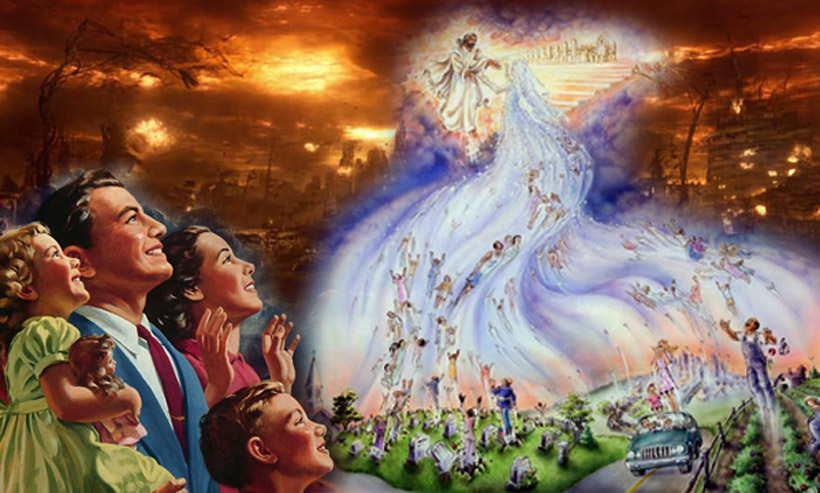Hollywood isn't to blame for getting the Christian view of the end times wrong—Christians are to blame. Christians have failed time and time again to preach a consistent, unified, and biblically faithful message, and Hollywood is simply going by what we have presented them.
Instead of preaching of God's desire to restore God's good creation and bring perfect shalom to the whole world—which is what the Bible actually teaches—U.S. American Christians have presented a portrayal of a god who wishes only to destroy the world and all God's enemies while spiriting away all the "born-again" believers to safety in some other-worldly place. Do not be deceived, that is a gnostic "gospel". It is dualism and escapism and it is what the world thinks Christians believe.
This summer, at least two Hollywood comedies will be based on this depiction of Christian eschatology, and they will perpetuate gross distortions of the Bible and of orthodox Christian theology.
In a recent NPR interview, co-writers and co-directors Seth Rogen and Evan Goldberg, discuss their new movie: "This Is The End" the first of the two movies to debut this summer.
Interviewer: "You quote from the book of Revelation in the movie. Did you actually go and read it?" Seth: "We did. But we actually kind of changed it to be a little more… haha… concise at times." Evan: "It's all up to interpretation." Seth: "Exactly. We unabashedly changed the Bible. Haha… In a few parts here and there." Evan: "We used to have in the script, 'Based on the book by God' but we changed that." Interviewer: Hahaha Seth: "But it's very… all the ideas, like the sinkholes, the smoke, the imagery, the hills on fire, all those ideas are stuff from the actual Bible, which we did read. Reading it was like crazy. It was like this was unbelievable." Evan: "Yeah, I thought it'd be wild, but it's like Lord of the Ring's got nothing on this!" Seth: "Yeah, it's like what happens in the movie. We don't take that many liberties with what happens."Or take as another example, the second summer Hollywoord movie dealing with the end times, is "Rapture-Palooza". In an interview with the cast, Rob Corddry, who plays "Mr. House" says,
To go back to the source material, the Bible describes the Antichrist as a very charismatic, handsome, leader. Right? …From a very wealthy family that everybody loves. ~6:25 [http://thehorrorchick.blogspot.com/2013/05/exclusive-video-interview-craig.html]This is where the infamous Left Behind series by Tim LeHaye has brought popular culture—to the point where there is no distinction between Christian fiction and "the source material, the Bible." In popular U.S. culture, as well as in Christian Fundamentalist circles, all of Revelation is meant to be taken literally and futuristically. For both groups, the last book of the Bible must correspond to the last days—end of the book, end of days—that's only logical, right? And for both groups, the end of days is a movie maker's dream come true. It is all about blood and guts, death and destruction, heaven and hell. But what if they're both wrong? What if Paul's letters to the Thessalonians and John's Apocalypse are actually both about faith in Jesus?
The Modern Myth of the Rapture
In modern Western Christian mythology, Paul's letter to the Thessalonians clearly teaches that one day, at some distant but imminent point in the future, all born-again evangelical Christians will suddenly be beamed up into heaven without warning and completely abandon the earth. These Christians will "meet Jesus in the sky" and "fly away" it is taught. Little thought is given to the implications of this doctrine. Yes, this would mean that Christians will abandon their children, families, loved ones, and friends who are not Christians. Yes, this would mean that vehicles like cars and planes being operated by these Christians would careen out of control, likely resulting in the deaths of many people. Yes, this would mean that positions necessary for the safety of others like air traffic controllers and subway operators would be abandoned. But who cares, right? Not to mention the implications this doctrine has for the Christian relationship to creation. A popular megachurch pastor recently commented, "I know who made the environment and he’s coming back and going to burn it all up. So yes, I drive an SUV." So the attitude this theology produces is one not only of apathy toward care of the creation, but it can also produce arrogant disdain, all out contempt. Who cares about how humanity pollute and exploits the earth, it's all going to burn, right? Conservative Christians constantly warn against allowing non-Christian culture to shape and control theology. I'm not sure if there could be any more clear example of how much the consumeristic, individualistic, capitalistic, consumption culture of the Western world has shaped this pastor's theology. But perhaps most ironic of all is that the Rapture isn't even biblical. It is based on a misunderstanding of a passage in Paul's first canonical letter to the Church at Thessalonica. In chapter 4, verses 16 and 17, Paul writes,For the Lord himself will descend from heaven with a shout of command, with the voice of an archangel and the trumpet of God. The dead in Christ will rise first; then we, who are left alive, will be snatched up with them on clouds to meet the Lord in the air; and so we shall always be with the Lord.Clearly what is vividly described in this text is the appearing the Lord Jesus, but not in the way the Left Behind series has depicted it. Instead, the consistent message of the Bible (Old and New Testaments) is that God affirms the goodness of the creation God made, and God will restore it to its original state of goodness. N. T. Wright writes,
Paul’s description of Jesus’ reappearance in 1 Thessalonians 4 is a brightly colored version of what he says in two other passages, 1 Corinthians 15:51-54 and Philippians 3:20-21: At Jesus’ “coming” or “appearing,” those who are still alive will be “changed” or “transformed” so that their mortal bodies will become incorruptible, deathless. This is all that Paul intends to say in Thessalonians, but here he borrows imagery—from biblical and political sources—to enhance his message. Little did he know how his rich metaphors would be misunderstood two millennia later. http://ntwrightpage.com/Wright_BR_Farewell_Rapture.htmBut the Rapture is good 'old time religion,' isn't it? Well, actually, no. It's a quite new and unprecedented view in Christian theology. Before the 18th century, it was altogether unheard of, being only hinted at by Puritan thinkers like Cotton Mather. And it didn't reach its current form until the 19th century, when John Darby the infamous dispensationalist really gave the doctrine shape. Millions of conservative Christians today believe they are standing in faith with the Christian tradition dating back to the apostles, when in reality they are standing with a very small fragment of U.S. American Fundamentalist Christians. Paul's concern in writing the Thessalonians is the same concern he continually had for all the communities with who's care he was charged: That the community of Jesus-disciples would grow in love for one another and in their collective witness to the life, death, and resurrection of Christ. Paul's not teaching anything Jesus Himself didn't teach when he promised to return. Paul is merely reminding the Thessalonians of this truth and encouraging them to persevere in faith.
The Myth of End Times Violence
The other part of the popular depiction of the end times by conservative evangelical Christians, which then gets picked up by Hollywood, is a bloody final battle in which God destroys all of the Church's enemies. This is a perennial favorite of U.S. Culture Warriors who warn of an impending doomsday scenario which the contemporary political climate nearly always foreshadows. Among some conservative Christians in the U.S. there is an unholy bloodlust for the destruction of those who reject Christianity, and the vision of a gruesome and merciless end times war serves to satisfy their vengeance fantasies. But how does this view square with the picture of God we have received in Christ? And is John's apocalypse introducing new information into that picture? In contrast to the God depicted as destroying God's enemies in this popular vision of the end times, the Gospels, Acts, and the apostolic letters present us with revelation of a God who shows up in Jesus of Nazareth, lives a life oriented toward the powerless in society, raises up a motley crew of folks despised like Him, challenges the powers that be in their oppression of the poor and weak, and ultimately gets executed for not only those on the margins but in the place of the hardened power-mongers. Jesus shows us a God who does not destroy His enemies but loves His enemies. So, what then does Revelation mean? Well, Jonathan Martin, helps shed some light on this subject in his book Prototype:Because John’s apocalypse uses war imagery, people often mistakenly assume that somehow the victory of God was incomplete on the cross, that the real victory comes when Jesus arrives with a sword and finally fights fire with fire, finally overcomes force with even greater force. But a careful reading shows that this is far from the case. For example, when Jesus comes riding in on a white horse with a sword, wearing a robe dipped in blood, it is not the blood of his opponents—it’s His own. There is no battle scene, because Jesus has already defeated the powers (and all the bullies) through His sacrifice on the cross. (p. 97)Martin is referring to the biblical motif called Christus Victor that teaches Jesus's self-sacrifice was a victory over Satan, the powers that be, and all the other forces of evil—the true enemies of Christians. For example, in Colossians 2.14-15 Paul writes,
Having canceled the written code, with its regulations, that was against us and stood opposed to us; he took it away, nailing it to the cross. And having disarmed the powers and authorities, he made a public spectacle of them, triumphing over them by the cross.Throughout the New Testament, the apostles and evangelists teach that Jesus's cross was sufficient for our salvation—the new way of being human Jesus creates. The cross is not an exception to the Way of Jesus, it is Jesus's very nature: Love. "This is how we know what love is: Jesus Christ laid down his life for us" (I Jn. 3.16a) "This is love: not that we loved God, but that he loved us and sent his Son as an atoning sacrifice for our sins." (4.10)
A Cruciform Embodied Apologetic
As those redeemed by a Crucified God, we worship a God who is self-giving love embodied. And when we joined with Christ in God's family, we take on the family resemblance—we become more like the God revealed in Jesus. We then embody self-giving love in precisely the same way Jesus did; we walk in His footsteps.To this you were called, because Christ suffered for you, leaving you an example, that you should follow in his steps. 'He committed no sin,and no deceit was found in his mouth.' When they hurled their insults at him, he did not retaliate; when he suffered, he made no threats. Instead, he entrusted himself to him who judges justly. 'He himself bore our sins' in his body on the cross, so that we might die to sins and live for righteousness; 'by his wounds you have been healed.' (I Pet. 2.21-24)In our reading of Revelation, and in our teaching of it's meaning, we must never allow our desire to predict the future obscure the Good News about Jesus's Kingdom being manifest in Jesus's life, ministry, death, and resurrection. That is not only the message of the Gospels, and that is not even just the message of the New Testament, that is the message of the entire Bible. And when we show the world that we care more about predicting when a special chosen few will fly away while a sadistic god destroys the world, we veil what John has meant to unveil—namely, the beauty of Christ and His Kingdom. The world is not to blame for misunderstanding the Bible's portrayal of end times—we are. And our failure is not in getting our eschatology "right", in terms of how human history will come to an end, but our failure is in not teaching and preaching the Person in whom all history is wrapped up. Our failure is in not embodying the message of self-giving love that only Jesus communicates. Our failure is in loving our lives and seeking to preserve them more than we love Christ and seek to live in His Way. If we ever expect Hollywood to repent and turn to Christ, we the Church should be showing the Way
*For more on interpretation of Revelation, I recommend Reversed Thunder by Eugene Peterson and Reading Revelation Responsibly by Michael Gorman.


